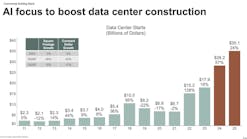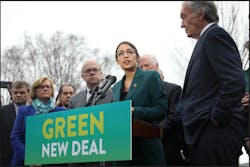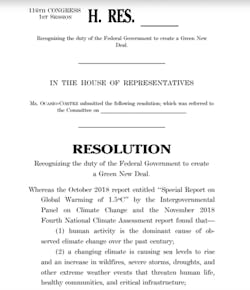Since I began writing Clark’s Remarks in June 2013, the topic about which I have written most frequently is climate change (and, since I live in coastal South Florida, its related sea level rise).
This space has been a great opportunity to introduce HPAC Engineering readers to new strategies – for both mitigation and adaption – and new products and technologies to support those strategies. In doing so, I have always tried to keep the focus on the science and away from the politics. After all, climate change is about science, and should never have become a political issue, too. A few readers – generally tending to be politically conservative – whom I have labeled “climate deniers”, have objected, claiming that the science doesn’t support the claims. Responding to those objections has been the only time, until now, when I felt that I could not remain totally apolitical on this topic. But now, the liberals have raised my ire, by putting politics ahead of science and common sense on the other end of the political spectrum.
Although the goals are laudable, they are aspirational only and not, in my opinion, even remotely achievable within the proposed timeline.
The basic premises behind (and introduction to) the resolution are the IPCC report issued last October and the NCA4 report released in November, both of which I wrote about and about which I have no questions as to their scientific validity. The Green New Deal document goes on to delineate a number of serious environmental concerns attributable to climate change, all of which I agree with, but then it jumps the tracks. According to Rep. Ocasio-Cortez, pretty much all of the social and economic woes in our country are also due to climate change!
Several of the action items (“Green New Deal goals”) proposed to be accomplished in the next 10 years (“Green New Deal mobilization”) are clearly not reasonable or practical. It is extremely unlikely that we will be able to meet 100 percent of our nation’s energy needs without any dependence on fossil fuels in the next 10 years. And the cost to replace every internal combustion car, truck, train, and plane – to say nothing of the nearly impossible logistics – would be huge, even if the technology could be found. According to experts, just replacing the existing fossil-fueled power generation equipment in the U.S. would cost literally trillions of dollars.
Likewise, upgrading all (again, as in 100 percent) of the country’s existing building inventory in the next 10 years is ludicrous. In many places, they can’t even get those buildings up to current building and fire codes, and now we’re going to tack-on another several trillions of dollars to make them energy efficient! Noah Smith, writing in Bloomberg Opinion, estimated the cost of the Green New Deal (an estimate that doesn’t include all of its goals) at $6.6 trillion a year. Since the government’s total revenue last year was estimated to be only $3.4 trillion, even a 70 percent tax rate for the wealthy won’t pay for it. Smith also points out his estimate assumes no cost overruns. Those of us in the construction-related industries know better than to count on that.
Yes, livestock (cattle, pigs, sheep, etc.) all fart methane, a potent greenhouse gas (GHG) that clearly contributes to climate change. However, I think that even my most ardent vegan friends will agree that the U.S. is not going to universally give up its meat consumption in the next decade! And, even if they did, how is that going to help raise farmers' incomes, which is yet another stated goal of this plan?
My concern with this type of rhetoric is that it dilutes real efforts to mitigate climate change.
As Greg Ip, writing in The Wall Street Journal, noted, "The Green New Deal promises to make climate mitigation both absurdly expensive and deeply partisan, and is thus more likely to set back than advance the climate cause”.
Even former NYC Mayor Michael Bloomberg, co-chair of America's Pledge to honor the Paris Climate Accords, and someone who is also considering a 2020 presidential run (but who isn’t?), said, “I’m a little bit tired of listening to things that are 'pie in the sky', that we never are going to pass, are never going to afford. I think it’s just disingenuous to promote those things. You’ve got to do something that’s practical.”
That pretty well sums it up for me.
A regular contributor to HPAC Engineering and a member of its editorial advisory board, the author is a principal at Sustainable Performance Solutions LLC, a south Florida-based engineering firm focusing on energy and sustainability.











